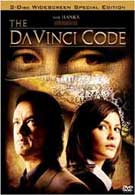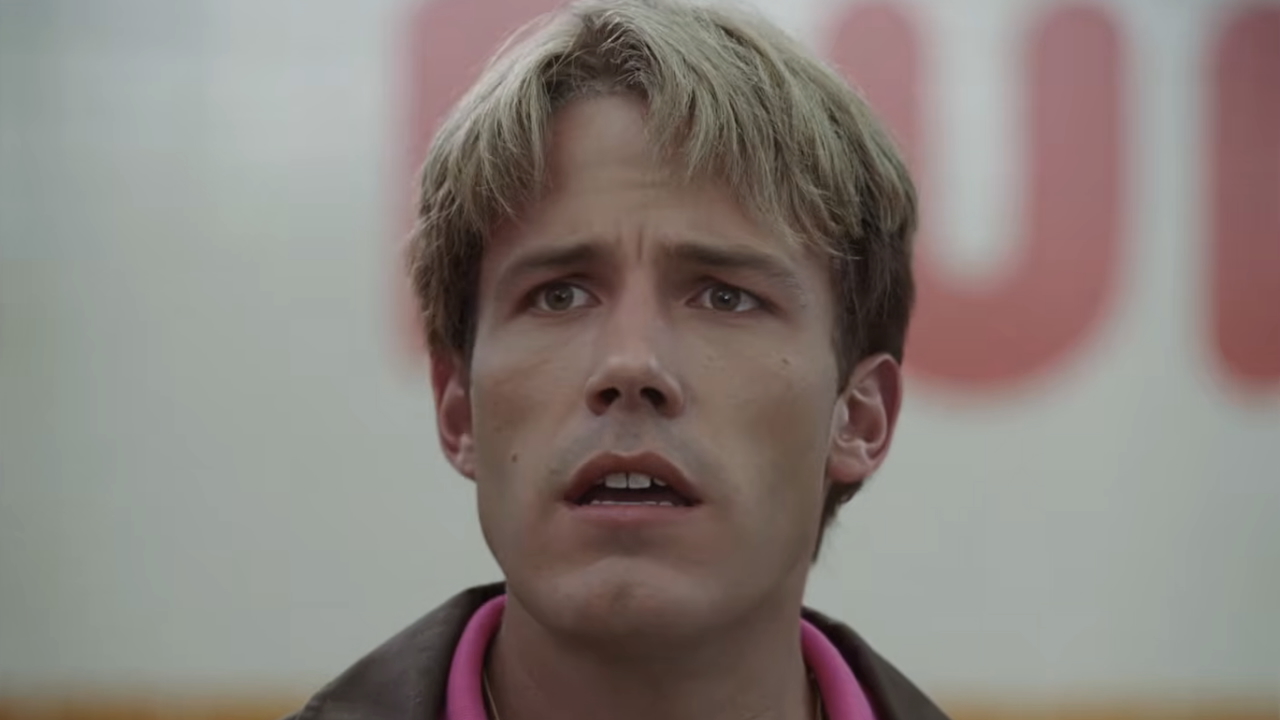The The Da Vinci Code, Director Ron Howard’s adaptation of the bestselling thriller by Dan Brown, generated a lot of controversy around the time of its theatrical release. Catholic groups protested and boycotted the movie because it claims that their church was suppressing a secret revelation alluded to in one of Leonardo Da Vinci’s famous paintings. This was sort of a stupid controversy. The real protesters should have been the poor suckers who spent $9 to watch this snooze fest. I think it is possible, considering the book was a mega-seller and the theatrical release of the movie made $750 million worldwide, that when I opened up my Two-Disc Widescreen Special Edition of The Da Vinci Code I was the only person in the world who did not know the plot of the story. Unfortunately, I do now. Harvard Symbologist Robert Langdon (Tom Hanks) is asked to view the crime scene of a murdered museum curator at the Louvre. Langdon and police cryptologist Sophie Nevue (Audrey Tautou), who is also the victims granddaughter, realize that the curator left some clues as to the identity or his murderer and the reason for his murder. Police Captain Fache (Jean Reno) is convinced that Langdon himself is the murderer but Langdon and Nevue elude Fache and set out to solve the mystery the murdered curator died protecting.
At the same time, Bishop Manuel Aringarosa (Alfred Molina) and his psychotically conflicted albino acolyte, Silas (Paul Bettany) are attempting to solve the same set of riddles in order to obtain and destroy the proof of a secret that will shake Christianity to its foundation. With Fache after them on the one hand and Silas on the other, Langdon and Nevue enlist the assistance of Holy Grail expert Leigh Teabing (Ian McKellen) to decipher the clues.
If the whole idea of two disparate groups trying to decipher ancient clues and riddles to find a secret treasure sounds familiar, it should. It was the basic plot for 2004’s National Treasure. While many consider National Treasure to be a rip-off of the novel The Da Vinci Code, it, despite a wildly improbable plot, was exciting, interesting, funny, and enjoyable to watch; in short, everything the movie version of The Da Vinci Code is not. There is no spark or life to make you care about the main characters, their quest, or their recurring peril. Hanks is uncharacteristically stiff, as though the weight of the book’s popularity is a straight jacket he can’t seem to get out of. He does fare slightly better than Tautou, who I’m convinced was hit in the head by a board prior to every scene, as she always looks dazed and unsure no matter what the situation. The supporting cast is not bad, McKellen chews up some scenery and Bettany projects the deep conflict in a man told to kill in order to further God’s work on earth. But since Hanks and Tautou are the key players, their weaknesses are a deficit the picture can’t overcome.
The plot itself doesn’t help much either. I’m told the script by Akiva Goldsman follows the book pretty closely, at least in terms of plot. If that’s true, I can’t really see what the fuss is about. The supposed twists, turns, and surprises are obvious from ten miles away. Is there really any doubt who the mysterious “Teacher” will turn out to be when finally revealed? Is anyone surprised when the Holy Grail was closer to Langdon and Nevue then they ever realized? I sure wasn’t, and I’m about as dense as they come. I had those “twists” and several others pegged early on, and I’m not bragging; it wasn’t difficult at all. In addition to the obviousness of the plot, the whole premise is somewhat underwhelming. Half-way into the film Teabing uses Da Vinci’s The Last Supper painting to show how the 15th century master left clues to what was REALLY going on between Mary Magdalene and Jesus (nudge, nudge, wink, wink.) I kept thinking “is that it?” I figured, based on the controversy generated, that there had to be more, but not really.
So, not much good acting, not a very interesting plot, and a very dark film, literally. Shot primarily inside churches, museums, old houses and the like, every scene seems dim, further adding to the listlessness the movie causes. I really think the two stars I accorded it is a bit of gift. It’s certainly better than Benchwarmers and The Shaggy Dog. If that’s not damning with faint praise, I don’t know what is. This Two-Disc set is certainly loaded with extras. All of them are found on the second disc and there is no commentary track to go along with the movie. It’s unclear why, although there is word that a Three-Disc super extra special edition is coming, and maybe it is being saved for that release. The extras are almost all featurettes, a hefty 90 minutes worth. They are all well done but will appeal primarily to big fans of the book and the movie. If you’re something of a De Vinci doubter, as I am, they tend to come across as cheerleading for a very bad football team.
The extras are kicked off by a short segment titled "First Day on the Set with Ron Howard." Director Howard discusses his first day of filming in Paris at the Louvre and his excitement related to filming the book and filming on location in Paris. I kept noticing that during the filming sections, he didn't have a beard and looked much better than he did in his interviews, which were done after he'd grown a beard. I guess that sort of gives you an idea of how much interest I had in the material.
About one-third of the entire extras running time is a featurette called “The Filmmaking Experience.” It gives an overview of the entire movie shoot, including behind-the-scenes footage, interviews, and discussion of key scenes. It looks like something intended to be shown on television prior to the theatrical release of the film, like an HBO “first look.” As with most of these types of promo pieces, they are long on “hey, this is an exciting film, and I’m thrilled to be a part of it” and short on any real insight.
Your Daily Blend of Entertainment News
Three short featurettes cover the casting and characters. Robert Langdon/Tom Hanks and Sophie Nevue/Audrey Tautou have their own segments. Of course, all of the people involved talk about how great they are as actors and how they were the perfect choice to play their parts. I'd hate to see the people who didn't get the part, if this was the best. They do show some segments without sound of screen tests for Tautou with Hanks but not the full tests by any actor. The third segment covers all of the major supporting characters and a brief discussion of the actors playing them.
Author Dan Brown has a brief segment where he talks about writing the book and the response to it (sidestepping any mention of the controversy it created.) He also gets in a plug for his upcoming book featuring the character of Robert Langdon. Hans Zimmer discusses his score in another featurette, "The Music of The Da Vinci Code."
There is a segment on the locations used in the film. The featurette is dominated by discussion of filming inside the Louvre and how excited everyone was to be able to be walking around near all those priceless art works without the usual crowds or in the dark using flashlights. This was somewhat interesting, but the same phrases seemed to come up from whoever they interviewed. There is also a "Close-Up on Mona Lisa" featurette. The cast and crew talk about their experience in seeing the Mona Lisa before filming started and there experience during the filming when they shot right next to the actual painting and in its gallery. I found it odd since the Mona Lisa isn't really the key painting in the movie but it is on the cover of the book as it holds the first clue.
The final two extras are a "Codes of The Da Vinci Code" segment and a demo of a PC movie game that can played on your computer. The codes featurette shows small clues dropped into the movie that represent other things or pay homage to people or ideas in the Da Vinci Code mythology. So when Langdon and Nueve are driving down the streets of Paris and pass a poster of an opera production of "Les Miserables" we learn that Victory Hugo was, supposedly, a member of the Priory of Sion, a key group in the book and movie.
The disc has a good look, presented in 2.40 anamorphic widescreen and sounds great in either Dolby 5.1 or Dolby 2.0 surround. The menus are easy to navigate and the extras have a "play all" function that makes it nice to sit down for an hour and a half and watch the whole group like a "making-of" documentary of the movie.
In the end, if you love the book, you'll probably like the movie more than I did. You may want to see it again on DVD. I can't imagine, though, after having seen this movie once in the theater, that anyone would want to watch it again and there is nothing on the DVD that screams, "get me!" If you skipped it in the theater and figured you'd wait until DVD, just keep waiting.

